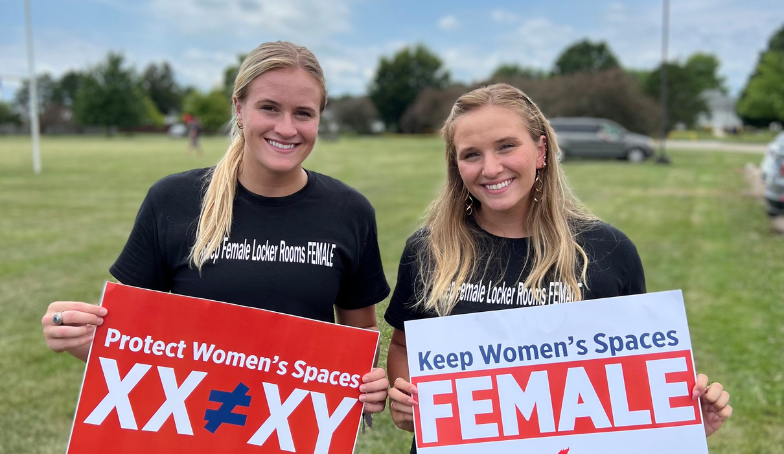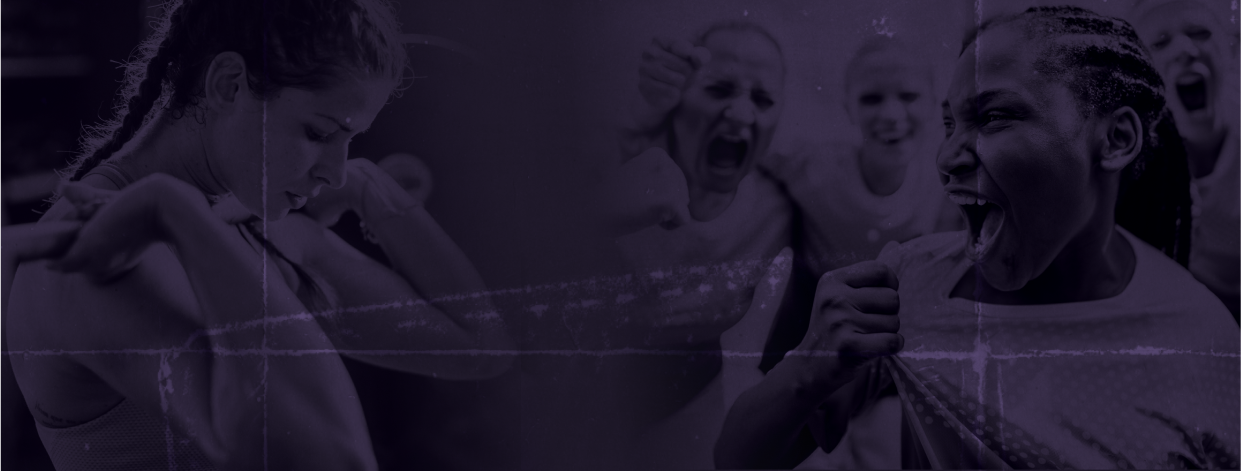Today, sisters Kaitlynn and Abbigail Wheeler are closer than ever. Despite their six-year age gap, they share a passion for athletics and are both accomplished swimmers. Abbigail attended older sister Kaitlynn’s swim meets practically from birth, cheering from the sidelines until she was old enough to join the team herself. Kaitlynn went on to swim for the University of Kentucky, while Abbigail honed her skills at the local YMCA. The sisters never imagined that they would each come face-to-face with the “war on women”—and that it would bring them together not only in defense of each other but in defense of the sport they love.
In 2022, Riley Gaines shot to national prominence after denouncing transgender-identifying swimmer Lia Thomas, who not only entered the women’s locker room at the NCAA Swim Championships but won the 500-yard freestyle event, usurping what should have been a biological female’s first-place finish. Gaines was not the only young woman in the locker room with Thomas that day, however. Kaitlynn was there, too.

“Riley and I had gone into [the locker room] to change, and it’s normally kind of loud in there,” Kaitlynn said, explaining that locker rooms are usually a place to laugh and chat before races.
As they were talking, she and Riley noticed a sudden “dead silence” fall over the room. Looking around, they realized with astonishment that there was a male changing alongside them.
“Thomas was in there changing in the corner,” Kaitlynn said. “We were like, ‘what do we do? Should we be running and screaming out of here? Is this supposed to be normal?’”
Out on the pool deck, Thomas’ presence in the locker room was a hot topic of discussion among the female swimmers. According to Kaitlynn, however, no one really believed that the NCAA would actually allow him to compete in their events. Up until the moment he took his place on the starting block, Kaitlynn hoped they would uphold the standards of fairness she and her teammates were counting on.
“When swimmers get up on the blocks, it’s very quiet, so that the athletes can hear the starter say ‘Take your mark,’” Kaitlynn explained. “So it was dead silent on the pool deck. And then all of a sudden, there was a disturbance, and someone yelled out ‘Cheater!’”

Kaitlynn doesn’t know who accused Thomas of cheating that day, but in her eyes, they were undoubtedly correct. Despite the women’s superior technique, Thomas maintained a significant advantage because of his sheer size and strength.
“When I watched him compete, his technique underwater was terrible,” Kaitlynn revealed. “Even though he was poor at all of the aspects that are required to be very good at this level, he was still beating [female] Olympians.”
Just over a year later, 16-year-old Abbigail walked into her YMCA locker room before swim practice, something she had never thought twice about. This time, however, an adult man was in the locker room too—and he was watching her.
“I immediately left and told my coach, ‘Hey, there’s a man in the locker room,’” Abbigail said. “He told me that the ‘Y’ had been aware of him for a long time but that there was nothing they could do under Illinois state law.”

Abbigail didn’t give up, speaking to the YMCA’s head coach and even the CEO about her concerns. Not only did she personally feel unsafe, but Abbigail said that the other females in the locker room did as well. Because the YMCA holds swim practices for people of all ages, children as young as five were changing in that locker room—where an adult man, wearing a women’s swimsuit, was allowed to sit and stare.
When these avenues failed, Abbigail took it upon herself to organize a petition to keep men out of the women’s locker room. Over 200 people agreed to sign.
“A lot of people weren’t happy about this,” she said. “Even the lifeguards were talking about it.”
Her petition wasn’t enough to effect change, however. As a last resort, Abbigail and a teammate took matters into their own hands and sent a message directly to the biological male in question by hanging signs outside of the women’s locker room. The hand-drawn signs read “Women Deserve to be Safe” and “Biological Females Only.”
The YMCA, whose hands were seemingly tied when it came to the presence of a potential predator in a normally sex-segregated, secure space, took swift action against an adolescent girl who simply wanted to feel safe.
“My coach told me that he felt it was no longer appropriate for me to practice with the team,” Abbigail said. “He said, ‘Just leave.’”

To add insult to injury, the YMCA not only kicked Abbigail off of her swim team, but also banned her from the YMCA altogether. This was a shock to her family, who had held a YMCA membership and whose daughters had swam and coached at their facility for years. In fact, Abbigail said it seemed so out of character for the organization that she decided to clarify the matter with her coach.
“I had told my coach that by allowing this person into the locker room, they were violating their mission statement,” Abbigail said. “I told him that they were feeding into a fantasy that people wanted to live in and that it was putting children at risk.”
The institutions that should have protected these young women instead caved to gender ideology, as Kaitlynn discovered that day at the 2022 NCAA Swim Championships when she, Gaines, and other female swimmers were exposed to male genitalia in their previously single-sex space. Like Abbigail, she sought help from officials, to no avail. In fact, she was told to be silent—or else.
“My team, especially Riley and myself, was very outspoken about this going into the meet,” Kaitlynn said. “But a week prior, our media person ‘educated’ us on pronouns, told us that we had to be respectful of Thomas, and said that we weren’t allowed to speak to reporters.”
She continued, “we were emotionally blackmailed into believing that we weren’t allowed to say anything, that we had to remain silent, because they didn’t want us to reflect badly on the university.”

In each case, Kaitlynn and Abbigail were forced into silence to preserve the comfort of biological males who sought to enter their spaces and take their trophies. According to the sisters, nothing about their upbringing could have prepared them for such unfair treatment.
Abbigail said that she and Kaitlynn grew up in a Christian household that taught them clear distinctions between right and wrong. “God says what’s right and what’s wrong,” she said. “We’re not supposed to judge—God will do that. But this is putting people at risk.”
For Kaitlynn, her faith informs her identity as a woman. “We’re defined by our ability to grow other humans inside of us, God willing,” she said. “But they say being a woman is about putting on a dress and lipstick, and it makes women a laughingstock.”
Kaitlynn explained that her experience with the gender ideology movement makes her afraid for the children who, like Abbigail, will be told they’re the problem.
“They’re demanding that everyone else conform to their fantasy world and their lifestyle; they’re gaslighting children and telling them that their feelings of discomfort are wrong,” she said. “This isn’t specific to our case. This is everywhere.”
Instead of remaining silent and fading into the background like they were supposed to, the sisters have formed a united front—and become closer than ever in the process.
“Our relationship has grown a lot,” Kaitlynn said. “When Abbigail was born, I got to be a big sister, and it was an honor to be a leader in that way and to help Abbigail grow. I would say we were pretty close, and this has brought us together even more. It’s brought our family together. Christ is guiding us through all of this, for sure.”

Although Abbigail began her swimming career in Kaitlynn’s footsteps, these demoralizing experiences have caused her to reconsider swimming in college—or even attending college at all. Although the passage of Title IX in 1972 enshrined equal opportunities for women in higher education and in sports, the Biden administration’s plan to enact sweeping changes to Title IX in favor of transgender athletes puts the future athletic careers of young women like Abbigail at risk.
“I’m not sure if I want to go to college and swim, or if I want to pursue a career right away,” she said.
No matter what their future holds, Kaitlynn and Abbigail plan to continue speaking out in support of women’s rights.
“Laws need to be enacted at the federal level,” Kaitlynn said. “Our family has been impacted by this twice now. It’s so important that we establish clearly written laws that state that women’s spaces need to remain sex-specific.”
“I hope that if someone does speak out, they know that I support them,” Abbigail added as a message to other young women affected by gender ideology. “Know that you aren’t alone in feeling the way you feel.”









